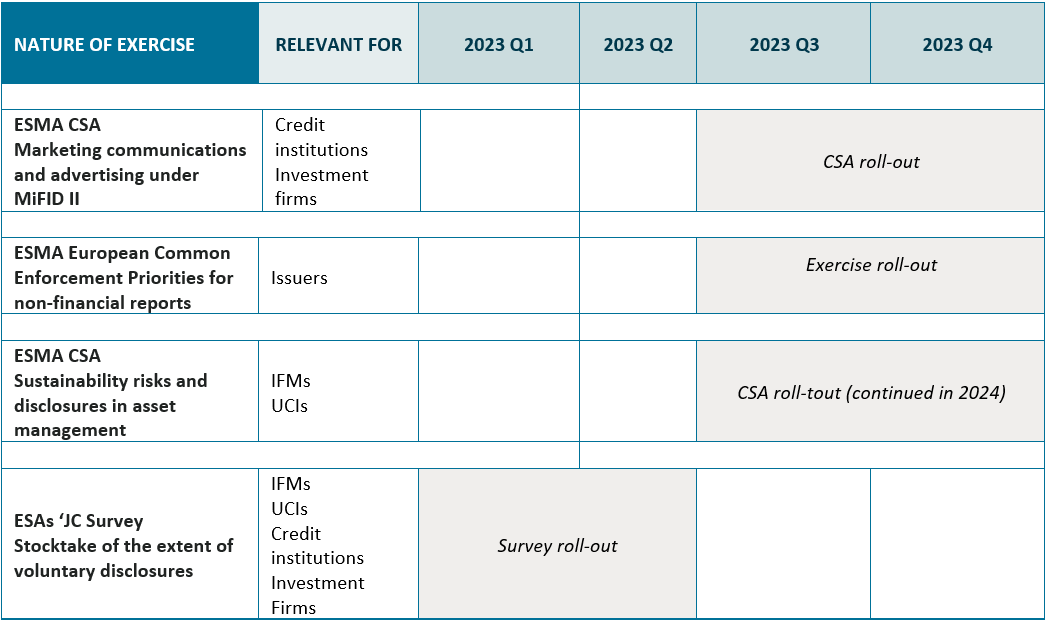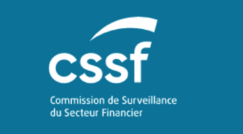The CSSF's supervisory priorities in the area of sustainable finance
The objective of the present document is to give a general overview of the CSSF’s supervisory priorities in the area of sustainable finance.
As the supervisory authority of the financial sector, the CSSF strives to accompany the transition of the financial sector and its players in a proactive way.
The integration of sustainability and adequate consideration of sustainability risks as key drivers of financial strategies is a long-term objective. In support of this ambition, the CSSF’s supervisory priorities in the area of sustainable finance aim at fostering a cohesive implementation of the sustainable finance framework across the financial sector and ensuring the integration of ESG requirements in the CSSF’s supervisory practice.
The regulatory framework in relation to sustainable finance continues to be further enhanced and progressively improved upon. In such an evolving context, and taking into account regulatory developments as well as developing practices, the CSSF will adopt a gradual approach to including the relevant changes in its supervision.
Notwithstanding, the primary responsibility of ensuring compliance with applicable requirements lies with the supervised entities and their board members, who should ensure that the integration of ESG factors in traditional governance, risk management and compliance tools is a focal point within their organisations, and endeavor to make suitable ESG education a priority for themselves and their personnel.
The present document is not to be construed as an exhaustive or definitive list. It rather aims at drawing the attention of the financial sector to a number of prominent matters to be addressed in this area. If deemed necessary, our supervision priorities may be adjusted, and the CSSF’s duties of ongoing prudential supervision may also warrant other ESG-related aspects to come under scrutiny.
Focus areas
Supervisory priorities for credit institutions
(i) Transparency and disclosures
The CSSF will ensure the supervision of disclosures obligations for credit institutions which fall in the scope of Regulation (EU) 2019/2088 on sustainability‐related disclosures in the financial services sector (SFDR) through the long form report, as revised per our Circular CSSF 22/821. The new long form incorporates in the Self-Assessment Questionnaire a dedicated section on sustainability disclosures. It also includes agreed upon procedure (AUP) reports to be established by the réviseur d’entreprise agréé on SFDR disclosures. Following the entry into application of the SFDR regulatory technical standards (the SFDR RTS), additional off-site reviews of the SFDR website disclosures at entity and products level will be performed on a sample basis.
In December 2022, the ITS on prudential disclosures on ESG risks in accordance with Article 449a of Regulation (EU) No 575/2013 were published in the Official journal. These ITS put forward the tables, templates, and associated instructions that large institutions with securities traded on a regulated market of any Member State must use in order to publicly disclose relevant qualitative information on ESG risks, and quantitative information related to climate. The CSSF will carry out a transversal review of Pillar 3 disclosures on ESG risks and will subsequently follow up with the institutions for which these requirements are of relevance.
(ii) Risk management and governance
Climate-related and environmental risks integration and mitigation shall be one of the priorities for the banking sector, as per the ECB’s priorities for 2022-2024.
The CSSF plans to repeat its self-assessment exercise on climate related and environmental risks with a new sample of approximately 15 to 20 less significant institutions (“LSI”) and third-country branches. The aim of the exercise is to review the level of alignment of the banking sector with the CSSF’s expectations set out in Circular CSSF 21/773 and provide dedicated feedback to credit institutions.
On-site inspections in relation to themes such as, amongst others, governance, business models and credit risks will include aspects with regard to climate-related and environmental risks. From year end or beginning of 2024 the CSSF also intends to carry out on-site inspections specifically focused on climate-related and environmental risks.
Credit institutions shall also be made aware that the CSSF is expecting to conduct, towards the end of the year, a sample-based review of the remunerations policies and practices in order to gain an understanding of how such policies have been updated to ensure consistency with the integration of sustainability risks in their governance and business models.
(iii) MiFID rules related to sustainability
The focus will be on understanding where the industry stands in the practical implementation of the MiFID rules related to sustainability.
The CSSF notably expects supervised entities that provide investment advisory or discretionary portfolio management services to collect and take into account all relevant information related to the sustainability preferences of their clients since 2 August 2022 and anticipate the entry into application of the ESMA guidelines on MiFID II Suitability requirements.
On-site inspections are set to start with an updated MiFID control plan integrating in particular the new sustainability-related obligations in the areas of product governance, suitability assessments, conflicts of interest, information to clients and internal control functions. As from 2024, the CSSF will launch dedicated MiFID on-site inspections capturing both obligations applicable to credit institutions and some aspects of the sustainability disclosures obligations applicable to investment firms.
Additionally, the ESMA CSA on marketing communications and advertising under MiFID II is set to include an assessment of how of sustainability-related product information and product characteristics are provided in the marketing communications and advertisements (see below our calendar of planned supervision exercises).
Supervisory priorities for the asset management industry
The CSSF will continue to monitor Investment Fund Managers’ (IFMs) compliance with the sustainability-related provisions as set forth under SFDR, the SFDR RTS and Regulation (EU) 2020/852 (the Taxonomy regulation). In so doing, the CSSF will take due consideration of the principles and guidance laid down in the ESMA Supervisory Briefing on Sustainability risks and disclosures in the area of investment management published on 31 May 2022. The CSSF will integrate any additional regulatory developments on the topic1 in its supervisory approach.
The CSSF will focus on the following priority areas in accordance with a risk-based approach:
(i) Organisational arrangements of IFMs, including the integration of sustainability risks by financial market participants
SFDR requires IFMs to comply with a set of rules regarding the integration of sustainability risks in their activities and outlines related mandatory website disclosures in this regard. The CSSF expects IFMs’ organisational arrangements to take due account of the integration of sustainability risks, notably in terms of human resources and governance, investment decision or advice processes, remuneration and risk management processes and policies and management of conflicts of interest as required under SFDR. The verification of the integration of those provisions in the IFMs’ organisational arrangements will remain an integral part of the CSSF supervisory approach.
(ii) Verification of the compliance of pre-contractual and periodic disclosures
SFDR, the SFDR RTS and the Taxonomy Regulation lay down transparency requirements regarding the provision of sustainability-related information in pre-contractual and periodic documentation of financial products. In this respect, the CSSF will continue to assess the compliance of pre-contractual and periodic disclosures of investment funds with the SFDR regulatory provisions.
(iii) Verification of the consistency of information in fund documentation and marketing material
The CSSF will continue to assess and verify that sustainability-related disclosures made are consistent across the fund documentation and marketing material.
(iv) Verification of the compliance of product website disclosures
The CSSF will continue to verify that IFMs comply with their obligations relating to the publication and maintenance on their website of SFDR related information for the investment funds they manage.
(v) Portfolio analysis
In line with the requirements of the Supervisory Briefing, the CSSF will undertake supervisory actions to ensure that portfolio holdings reflect the name, the investment objective, the strategy, and the characteristic displayed in the documentation to investors.
The CSSF has launched a dedicated SFDR data collection exercise in view of fulfilling its supervisory duties, and also to carry out the above verifications. This data collection exercise has been extended on 24 March 2023 to product disclosure information. A dedicated SFDR FAQ2 as well as CSSF Communiqués on SFDR have also been published to provide additional guidance and clarifications to the industry in this regard. The CSSF will continue to provide similar clarifications to the investment fund industry as need may be.
Supervisory priorities for investment firms
(i) Transparency and Disclosures
As regards the disclosures obligations applicable under SFDR to investment firms providing investment advice and portfolio management services, it is envisaged to establish a self-assessment questionnaire to be addressed to all investment firms, as part of the contemplated reform of the long-from report.
(ii) Risk management and governance
The CSSF will implement a gradual approach to its supervision of ESG risks for investment firms, prioritising the recognition of ESG risks in investment firms’ strategies and governance arrangements. Circular CSSF 20/758 on administration, internal governance and risk management will be updated in due course.
(iii) MiFID rules related to sustainability
The CSSF’s supervisory priorities for investment firms will mirror those as described above for credit institutions.
Supervisory priorities for issuers
As in previous years, ESMA, together with the European national accounting enforcers, including the CSSF, identified European common enforcement priorities (the “ECEPs”) for the 2022 annual reports to which particular attention will be paid when monitoring and assessing the application of the relevant reporting requirements.)
Climate-related matters have been identified as a priority for both IFRS financial statements and non-financial statements.
As climate-related matters were already identified as an ECEP for the 2022 campaign, the CSSF carried out focused examinations of the 2021 financial and non-financial information of issuers for which significant climate-related risks were identified.
The results of this review highlighted that this priority remains particularly relevant for 2022 annual reports. Therefore, in order to address this priority, the CSSF will tailor its review procedures in view of addressing both the aspects covered by this ECEP and the follow-up of the observations made during its 2022 campaign thereon.
The information required under Article 8 of the Taxonomy Regulation for relevant issuers is also one of the ECEPs for the upcoming campaign, as these non-financial issuers are required to disclose, for the first time, the alignment of their economic activities with climate change mitigation and adaptation objectives, as provided by the regulation.
For further information on this topic, please refer to our communication published on 2 January 2023.
International cooperation in sustainable finance
The CSSF's role
Given the international, far-reaching, and cross-cutting scope of sustainable finance, an important part of the CSSF’s role is to ensure the representation of Luxembourg in national, European and international groups driving initiatives relating directly or indirectly to sustainable finance.
The CSSF supports the European Supervision Authorities (the “ESAs”) and international bodies such as the Basel Committee on Banking Supervision (BCBS), the European Financial Reporting Advisory Group (EFRAG), International Sustainability Standards Board (ISSB), and the Network for Greening the Financial System (NGFS) in promoting the coherence, cohesiveness, and consistency of the sustainable finance framework. In that context, the CSSF will continue to cooperate with relevant European and international bodies to aim for the clarification of a number of fundamental concepts, and the consistency of initiatives in the area of international disclosures.
Schedule of supervision exercises at the initiative of the European authorities
Based on the tentative calendar available at the time of the present communication, the CSSF would like to provide a simplified overview of supervision exercises in the area of sustainable finance, as planned by the ESAs and based on available information to date:

1 For instance, ESMA is currently working on Guidelines on funds’ names using ESG or sustainability related terms.
2 The CSSF SFDR FAQ also provides for an overview of the CSSF Communiqués on SFDR.























































First, please LoginComment After ~